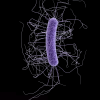Healthcare-associated infections are infections that patients can get while receiving medical treatment in a healthcare facility. One opportunistic pathogen, Clostridium difficile, has been getting more attention in recent years because of its association with antibiotic use and a high death rate among the elderly. This 7-page factsheet will provide an overview of Clostridium difficile infection (CDI) with a focus on healthcare-associated infections. Written by Soohyoun Ahn and Amarat H. Simonne and published by the UF/IFAS Department of Food Science and Human Nutrition, January 2018.
http://edis.ifas.ufl.edu/fs253
Tag: Aging: Health and Wellbeing
The Art of Goodbye: Exploring Health Concerns
Issues and questions about care at the end of life are as unique and complex as the individual receiving care. The condition and culture of the patient and family, religion, spirituality, education, occupation, social class, friends, and personal preferences can affect end-of-life care. Sometimes decisions are made by the individual patient. At other times, the family and health care providers are involved. This 6-page fact sheet, part of a new series entitled The Art of Goodbye, explores health concerns and discusses aspects and types of care at the end of life. Written by Lynda Spence, and published by the UF Department of Family, Youth and Community Sciences, July 2016.
http://edis.ifas.ufl.edu/fy1467
Clostridium difficile: an Important Opportunistic Pathogen in Healthcare-Associated Infections
 Opportunistic pathogens are significant health threats to vulnerable people with weakened immune systems, such as people with HIV/AIDS or those on immune-suppressing therapies. One opportunistic pathogen, Clostridium difficile, has been getting more attention in recent years because of its association with antibiotic use and high death rate in the elderly. This factsheet will provide an overview of Clostridium difficile infection (CDI) with a focus on healthcare-associated infections. This 5-page fact sheet was written by Soohyoun Ahn and Amarat H. Simonne, and published by the UF Department of Food Science and Human Nutrition, September 2014.
Opportunistic pathogens are significant health threats to vulnerable people with weakened immune systems, such as people with HIV/AIDS or those on immune-suppressing therapies. One opportunistic pathogen, Clostridium difficile, has been getting more attention in recent years because of its association with antibiotic use and high death rate in the elderly. This factsheet will provide an overview of Clostridium difficile infection (CDI) with a focus on healthcare-associated infections. This 5-page fact sheet was written by Soohyoun Ahn and Amarat H. Simonne, and published by the UF Department of Food Science and Human Nutrition, September 2014.
http://edis.ifas.ufl.edu/fs253
Where’s the Water? (FSHN1113/FS178)
Foods vary widely in water content. You may be surprised to find out that many common foods that are not liquids are quite high in water! This 5-page fact sheet offers a brief quiz and pictorial answer key, written by Wendy J. Dahl, and published by the UF Department of Food Science and Human Nutrition, May 2011.
http://edis.ifas.ufl.edu/fs178
¿Donde está el agua? (FSHN1113S/FS179)
Foods vary widely in water content. You may be surprised to find out that many common foods that are not liquids are quite high in water! This 5-page Spanish-language fact sheet offers a brief quiz and pictorial answer key, written by Wendy J. Dahl, and published by the UF Department of Food Science and Human Nutrition, May 2011.
http://edis.ifas.ufl.edu/fs179
Modificación de la textura de alimentos para los adultos mayores (FSHN1008S/FS183)
This 2-page Spanish-languagefact sheet discusses information on altering food texture for older adults, and offers tips for enhancing puréed and ground foods. Written by Wendy J. Dahl and published by the UF Department of Food Science and Human Nutrition , May 2011.
http://edis.ifas.ufl.edu/fs183
Prolemas para tragar y el adulto mayor (FSHN1103S/FS182)
A swallowing problem may be a serious health issue for an older adult. This 3-page Spanish-language fact sheet describes common reasons for problems chewing and swallowing, why this is a concern, and where to get more information. Written by Wendy J. Dahl , and published by the UF Department of Food Science and Human Nutrition, May 2011.
http://edis.ifas.ufl.edu/fs182
Comidas en puré para problemas al tragar (FSHN1107S/FS181)
Although we all enjoy puréed foods as a part of a healthy diet, puréed diets may be recommended for frail older adults who have chewing and/or swallowing problems. This 4-page Spanish-language fact sheet describes reasons to prepare puréed foods and tips for preparing and serving great tasting and ready to swallow puréed foods. Written by Wendy J. Dahl , and published by the UF Department of Food Science and Human Nutrition, May 2011.
http://edis.ifas.ufl.edu/fs181
Puréed Foods for Swallowing Problems (FSHN1107/FS168)
Puréed foods are prepared by mashing, grinding, or chopping food until a very fine, smooth texture is achieved. Mashed potatoes, squash, and pumpkin pie filling are examples of puréed foods. Although we all enjoy puréed foods as a part of a healthy diet, puréed diets may be recommended for frail older adults who have chewing and/or swallowing problems. This 3-page fact sheet describes reasons to prepare puréed foods and tips for preparing and serving great tasting and ready to swallow puréed foods. Written by Wendy J. Dahl, and published by the UF Department of Food Science and Human Nutrition, March 2011.
http://edis.ifas.ufl.edu/fs168
Swallowing Problems and the Older Adult (FSHN1103/FS164)
A swallowing problem may be a serious health issue for an older adult. This 2-page fact sheet describes common reasons for problems chewing and swallowing, why this is a concern, and where to get more information. Written by Wendy J. Dahl, and published by the UF Department of Food Science and Human Nutrition, March 2011.
http://edis.ifas.ufl.edu/fs164
FCS2299/FY1090 Body Image and the Aging Female
FCS-2299, a 3-page illustrated fact sheet by Eboni J. Baugh, highlights recent research examining the body image concerns among aging and elderly women. Includes references. Published by the UF Department of Family Youth and Community Sciences, May 2009.
http://edis.ifas.ufl.edu/FY1090

